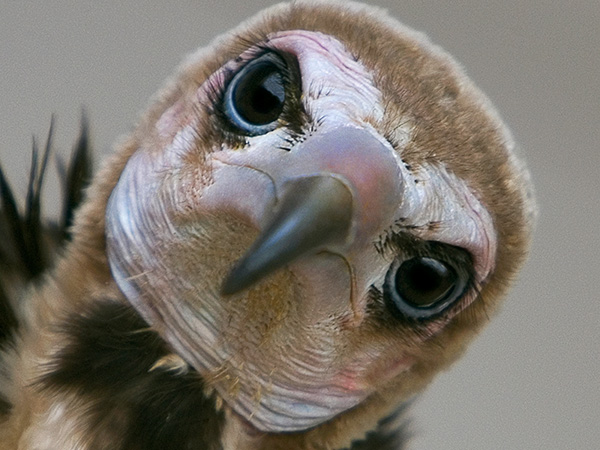Breeding big things at ICBP

Spring brings broods of babies to the International Centre for Birds of Prey to help with conservation worldwide.
As the weather starts to warm up, the ICBP’s breeding programme gets into full swing.
As part of the important conservation work done at the ICBP, nurturing clutches of eggs is vital to learn as much as possible about the many species of birds of prey, some of which are critically endangered, and facing extinction.
Eggs have started hatching, and the bird staff are on hand to help around the clock to welcome the new editions to the family.
Currently, the ICBP have had baby Lugger and Barbary Falcons, Great Horned and Ural Owls, Brahminy Kites and a Condor chick through the brooder room with many more to come we hope.
Eggs are often removed from the parents in programmes of captive breeding to optimise their chance for survival. Eggs are fragile, and accidents often happen, with the parent birds inadvertently damaging the shells, or failing to keep them warm enough.
To maximise the breeding success at the ICBP, eggs are replaced with ‘mock’ eggs, made from wood or plastic, and designed to mimic the eggs they have replaced.
Holly Cale, Curator and Breeding Specialist, said: "We breed by design, and are mindful to be selective and not produce birds we aren’t able to house or find suitable homes for.
We select which birds we are trying to learn more about, and pass this knowledge on worldwide to other breeding programmes.
Although it is often challenging, and things don’t always go to plan, the positives far outweigh the lows that come when we are not successful.
The joy of hatching that important species, or a new first for the Centre is immeasurable, and we are proud to be able to share that with both visitors and the avian world."
The chicks, when hatched, are closely monitored to ensure peak conditions for their health.
The brooders, and the brooder room, are kept at prime temperature to ensure the babies’ wellbeing, and slowly reduced as the chicks grow stronger and larger in readiness for them leaving the breeding room, and returning to their parents.
This emulates the warmth and protection offered by parent birds, as the very young are covered, or ‘sat on’ by mum or dad until they are strong enough to be left exposed in the nest.
The chicks’ diet is a rich blend of minced rats and quails (bones and all) and chicken, to ensure that all the right nutrients and calcium is received by the babies to grow.
This again imitates what their parents would feed them as much as possible in the wild.
The babies are fed at three times throughout the day, and visitors are encouraged to watch us feeding the babies after the 2.00pm demonstration through the brooder room window. You can see how ICBP staff hoot at the baby owls to encourage feeding, or chup and touch the roof of the mouths of the baby falcons to trigger their mouths to close around the food.
Once the chicks are a few days old, and strong and healthy, they are returned to their nests with their parents, who are monitored closely, and generally happy to assume their parenting duties.
Some chicks are also cared for by foster parents, for example if the natural parents have rejected the eggs, or if the eggs have been laid elsewhere and incubated at the centre. 'Hemp', the Eurasian Eagle Owl at the ICBP, often gets very broody, but has no desire to mate. She will happily sit on a clutch of eggs not her own as a living incubator, whatever their type. She is then is rewarded with a chick to rear.
Hemp is a great mother and does not mind what species of owl she is given (within reason!). She has reared Abyssinian Eagle Owl Chicks, Spectacled Owl chicks, and even orphaned wild Tawny Owl chicks, which are then released back to the wild.
Jemima Parry-Jones (MBE), Director, said: "The knowledge we gain from our captive breeding programmes is vital in better understanding the habits of birds of prey.
"We need to watch and learn from all the different ways the different birds breed, and what conditions suit them best to ensure the best chance of success for their eggs.
We can then share this knowledge to help breeding programmes across the world.
Each and every one of you, when you visit, volunteer, sponsor a bird, become a member and donate, help us continue this vital work – so thank you - and keep supporting us please!".
The conservation work done by the International Centre of Birds of Prey helps protect and sustain many species of birds of prey across the world. The centre is a registered charity and relies on its visitors and supporters to raise the necessary funds to carry on with this important work.
Please contact Jen Keen, comms@icbp.org if you want to get involved with fundraising or donating, or email Pippa Halling at volunteer@icbp.org if you’d like to volunteer your time here at the centre.
There is lots more information on the website.
The International Centre for Birds of Prey marks its 50th Anniversary this year - so no better time to visit!
Explore Gloucestershire
20 April 2017
For further information.
OTHER NEWS
